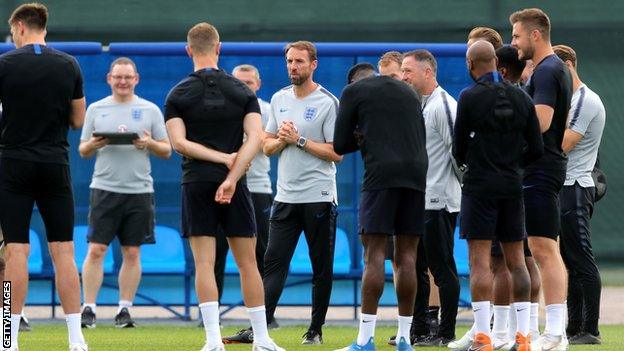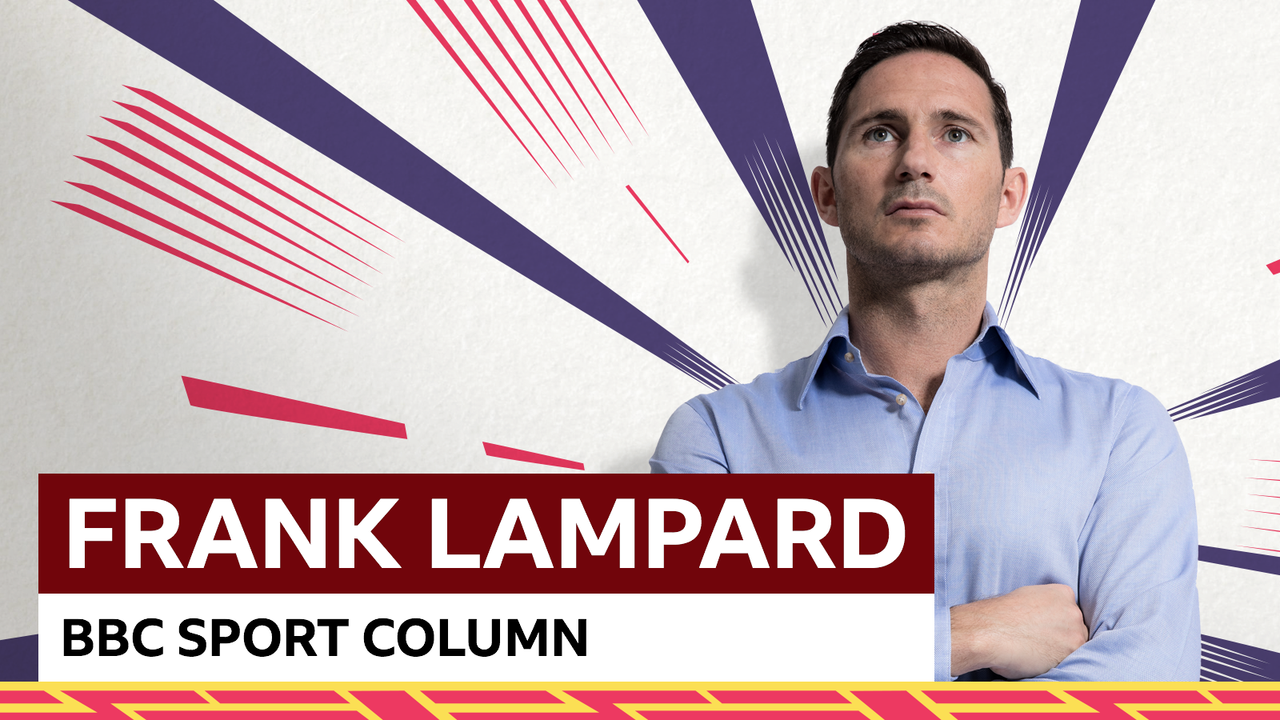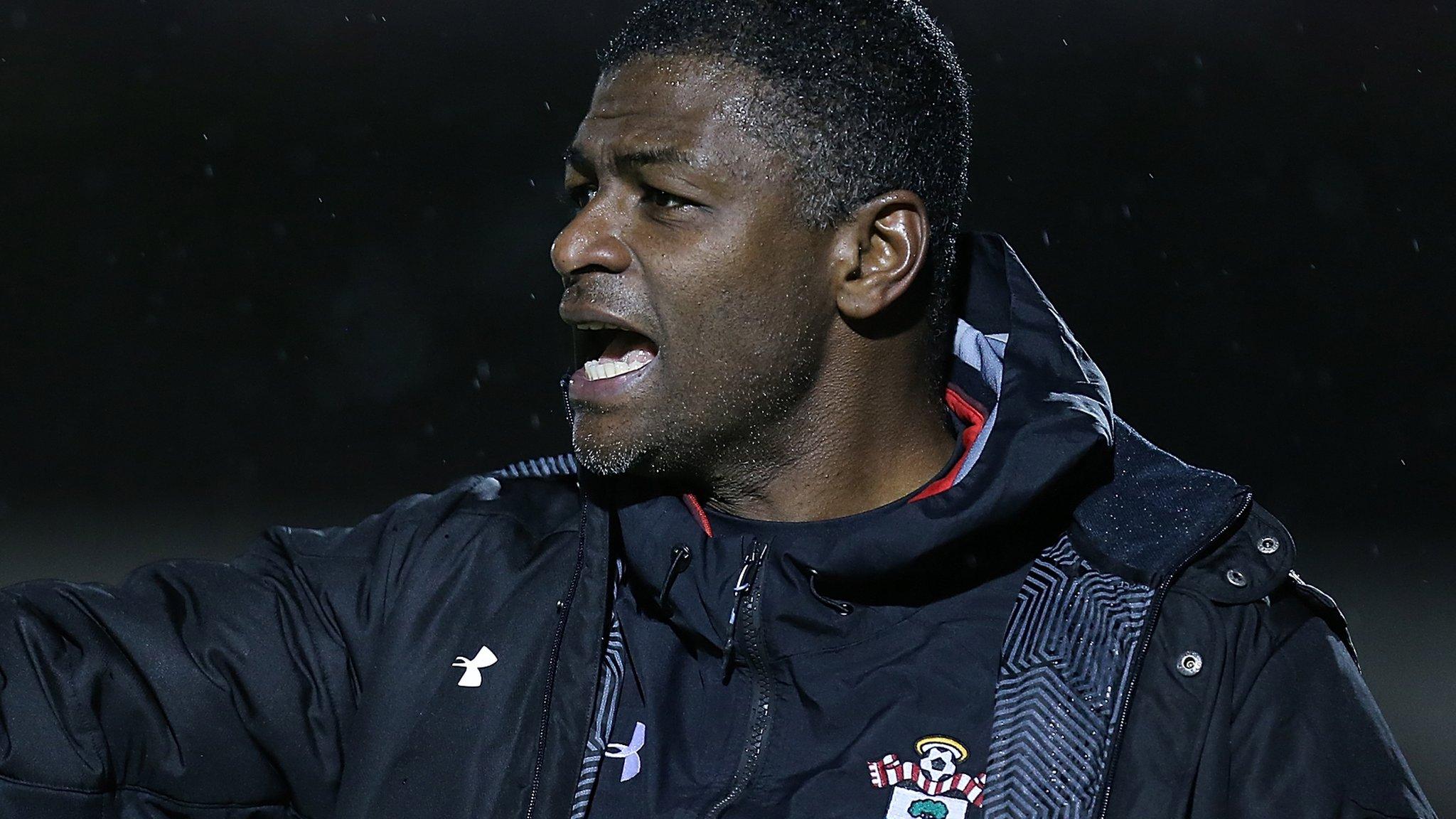World Cup 2018: England ready to take on Tunisia in their first match
- Published
- comments

England manager Gareth Southgate has told his squad who will be playing against Tunisia on Monday
Reporting from Volgograd
England have decamped from the serenity and seclusion of their Repino retreat to join the heat of World Cup battle in Volgograd's searing temperatures.
Gareth Southgate's squad have been hidden away behind the wooden gates of their hotel on the Gulf of Finland, when not at their Zelenogorsk training base a short distance away.
They have flown to the historic city where they will open their World Cup campaign against Tunisia on Monday.
An open house public relations approach, coupled with the mood of calm that has surrounded England, has provided a sure-footed countdown to the first game - but now it gets serious.
Time to turn smooth PR into World Cup success
England and the Football Association have embarked on a successful charm offensive to ensure a World Cup build-up without a wrinkle. It seems the nation actually likes this team after the days of WAGs and industrial-scale failure at major tournaments.
The nation will like them even more if they beat Tunisia - but World Cups can be a fickle business and any amount of bridge-building can be brought down by one bad result.
This is why so much hinges on events in Volgograd on Monday.
There has been a bonding (of sorts) between squad and media. The "Super Bowl" press day in the Futsal Hall at St George's Park, with all 23 players available for interview, was a pipe dream made real while the relationship has continued in Repino's Cronwell Park Hotel, where interviews are conducted and a darts challenge has been organised.
It's all very human. All very common touch. There are the stories of players watching Love Island - ITV2 was chosen as one of the four channels they could have screened in their hotel - and fierce competition over the computer game Fortnite.
This team is the image of Southgate, a civilised human being with a touch of steel many still do not recognise.
Even the traditional debate over team selection and formation has taken a back seat, with Southgate settling on a three-man defensive system while watching England Under-21s at the European Championship in Poland last summer.
Minor selection debates have taken place, such as Dele Alli's potential position and the battle between Jordan Henderson and Eric Dier in central midfield, but there has been nothing to overshadow the general feeling of harmony.
Shearer and Jenas select their England XI
This feels very different to the mood of two years ago. One of the early signs of England's siege mentality at Euro 2016 was goalkeeper Joe Hart's unsmiling refusal to answer amiable and well-meaning questions about a darts tournament organised by players on the first day of media activity.
It set a needlessly hostile tone and ultimately Hart's own dreadful performance came to symbolise a tournament where England got so much wrong on and off the pitch.
Fast forward to Russia 2018, and there is now a darts challenge under way between players and media - although Gary Cahill, Jordan Pickford and Dele Alli have already given England a 3-0 lead over the press, one that shows every likelihood of being extended.
Southgate gave an insight into his thinking when he told BBC Sport: "What I said to everybody was: 'If you had a blank canvas in your area of work, then what would it look like?' The communications guys had an idea.
"The players are used to getting their own message out there - to tell their story is really important. I've worked on tournaments with the media around - and know what is needed. I understand that media outlets need content. If you have one player talk each day, then it's difficult for people to fill their newspapers.
"If the players are going to perform well, then they need to be relaxed. In our hotel, there are 23 mates having fun - playing basketball in their spare time. Our preparation is good and our training is good."
They are nice touches and the darts is a move away from more uncooperative times - but it will count for nothing if England fail to get the job done against Tunisia or falter against Panama and Belgium.
Southgate's managerial mindset
Southgate kept public appearances and utterances to a minimum after arriving in Russia. But his body language reflects what we have seen in England's squad since touchdown.
He looks relaxed and assured but is not avoiding the weight of responsibility that will be carried into the sweeping Volgograd Arena.
The manager offers context to an England squad containing youth and experience, from his own anguish over having a penalty saved in the Euro 96 semi-final shootout defeat by Germany, through the lessons learned under managers as varied in approach as Terry Venables and Sven-Goran Eriksson.
Two engagements, one birth and four birthdays so far in England 'family'
He cut an impressive figure in his final pre-match briefing, hitting the right notes in his call for "brave, bold attacking football" but also impressing his Russian hosts with his grasp of Volgograd's historic significance., external
Under its former name, Stalingrad, it was the site of a symbolic battle during World War Two. As a monument to that battle, The Motherland Calls - the tallest statue in Europe - dominates the skyline.
Southgate said: "We are aware of the history of the city and the importance of that battle in the Second World War. To see the statue in the city reminds you that some things are even bigger than football and that's good perspective for us all."
The manager was an impressive front man as England arrived on the western bank of the Volga in an environment where temperatures in the 30s provide a sharp contrast to the mild climate from Repino.
His most important task, though - the one that truly shapes a managerial reputation - starts when England kick off against Tunisia.
England's minimum requirement
World Cup 2018: What would happen if England actually won the World Cup?
Simple. Victory.
It is time England got off the back foot at a major tournament and started with a win.
It is no coincidence that England's last respectable showing in one of these showpieces came on the last occasion they opened with a win, against Paraguay at the 2006 World Cup.
They have since made life difficult for themselves, establishing an accident-prone reputation.
The roll of dishonour is lengthy. Goalkeeper Rob Green's error cost England an opening victory against the United States in South Africa in 2010; defeat by Italy in Brazil four years later set the tone for a group-stage exit. The careless concession of a late equaliser against Russia led to the scars of Euro 2016.
England have previous for carelessness and it must stop in Volgograd.
If the big players - such as Alli and captain Harry Kane - join the World Cup party started by Cristiano Ronaldo's immense display for Portugal against Spain on Friday, then Volgograd can be the start of a satisfying Russian journey for England.
- Published17 June 2018

- Published17 June 2018
